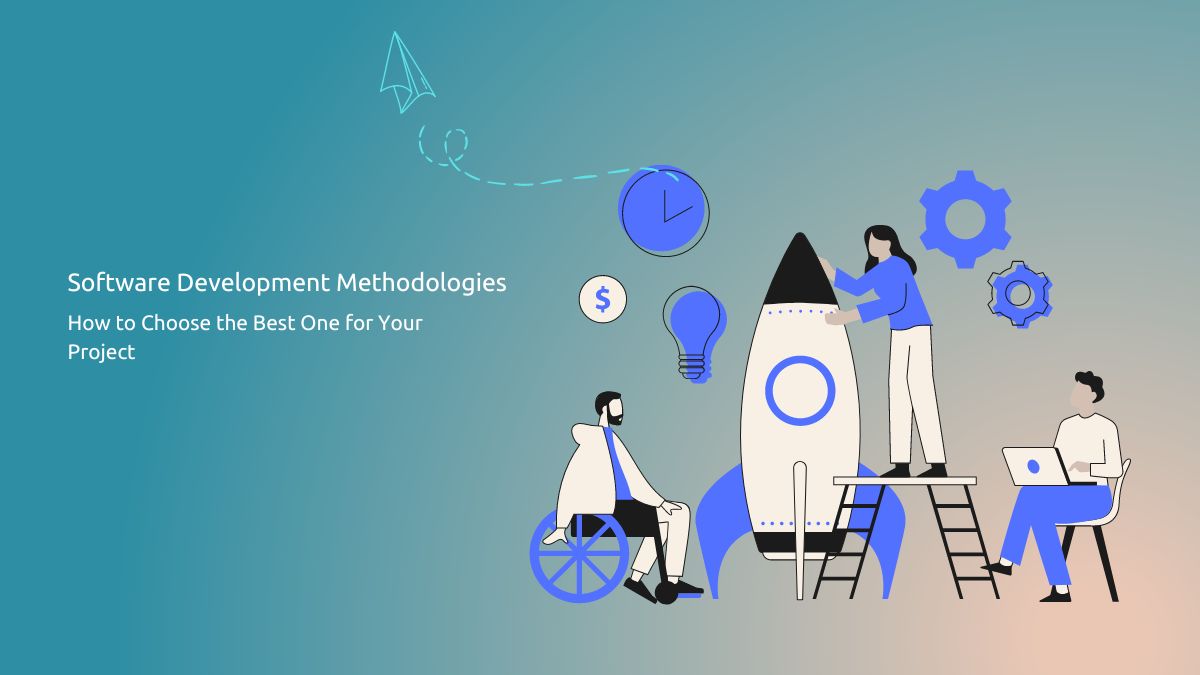Table of Contents
Software development methodologies
Software development methodologies are the frameworks and processes that guide how software projects are planned, executed, and delivered. They define the roles and responsibilities of the project team, the scope and timeline of the project, the quality and testing standards, and the communication and feedback mechanisms.
Choosing the right software development methodology for your project is crucial for its success. But with so many options available, how do you decide which one is best suited for your needs?
In this blog post, we’ll explain what software development methodologies are, why they are important, and how to choose the best one for your project. We’ll also cover some of the most popular software development methodologies, such as Agile, Waterfall, and Lean.
What are software development methodologies?
Software development methodologies are the sets of rules and practices that help software developers manage their projects effectively. They provide a structured approach to software development that helps ensure quality, efficiency, and customer satisfaction.
Software development methodologies can vary in terms of: – The phases and activities involved in the software development lifecycle (SDLC) – The deliverables and artifacts produced at each phase – The roles and responsibilities of the project team members – The degree of flexibility and adaptability to changing requirements – The level of collaboration and communication among stakeholders.
Some of the benefits of using software development methodologies are:
– They help align the project goals and expectations with the customer’s needs and preferences
– They help reduce risks and uncertainties by defining clear objectives and milestones
– They help improve productivity and efficiency by streamlining the workflow and eliminating waste
– They help enhance quality and reliability by enforcing standards and best practices
– They help foster innovation and creativity by encouraging feedback and experimentation.
Why are software development methodologies important?
Software development methodologies are important because they can have a significant impact on the outcome of your project. Depending on the nature and complexity of your project, some methodologies may be more suitable than others.
For example, if you have a large-scale and well-defined project with a fixed budget and deadline, you may want to use a traditional methodology like Waterfall that follows a linear and sequential process. On the other hand, if you have a small-scale and dynamic project with changing requirements and customer feedback, you may want to use an agile methodology like Scrum that follows an iterative and incremental process.
Using the wrong methodology for your project can lead to problems such as:
– Miscommunication and misunderstanding among stakeholders
– Scope creep and feature creep that increase costs and delays
– Low-quality and buggy software that fails to meet customer expectations
– Dissatisfaction and frustration among project team members
Therefore, it’s important to choose a software development methodology that matches your project’s characteristics, goals, and constraints.
How to choose a software development methodology for your project?
There is no one-size-fits-all solution when it comes to choosing a software development methodology for your project. Different methodologies have different strengths and weaknesses, and what works for one project may not work for another.
However, there are some factors that you can consider when comparing different methodologies, such as:
– The size and complexity of the project
– The goals and expectations of the stakeholders
– The skills and experience of the project team
– The budget and timeline of the project
– The level of risk and uncertainty involved

What are some of the most popular software development methodologies?
There are many software development methodologies to choose from, each with its own advantages and disadvantages. Some of the most popular ones are:
Agile
Agile is a flexible and iterative approach that emphasizes customer satisfaction, collaboration, and adaptation to changing requirements. Agile projects are divided into short cycles called sprints, where the team delivers working software increments and gets feedback from the stakeholders. Agile methods include Scrum, Kanban, XP, and others.
Some of the benefits of agile are:
- It allows for faster delivery and validation of software features
- It improves customer satisfaction by involving them throughout the process
- It enhances team morale by empowering them to make decisions
- It fosters continuous improvement by encouraging learning and experimentation
Some of the challenges of agile are:
- It requires a high level of communication and coordination among team members
- It may result in scope creep and feature creep if not managed properly
- It may not be suitable for complex and regulated projects that require extensive documentation and planning
Waterfall
Waterfall is a linear and sequential approach that follows a predefined set of phases, such as analysis, design, implementation, testing, and deployment. Waterfall projects are planned in advance and have clear specifications and deliverables. Waterfall methods are suitable for stable and well-defined projects with low uncertainty.
Some of the benefits of waterfall are:
- It provides a clear and structured roadmap for the project
- It facilitates quality control and risk management by defining standards and checkpoints
- It simplifies project management and reporting by having clear milestones and deadlines
- It minimizes changes and rework by having a fixed scope and budget
Some of the challenges of waterfall are:
- It can be rigid and inflexible to changing requirements and customer feedback
- It can be slow and costly to deliver software features
- It can reduce customer satisfaction by delaying their involvement until the end of the project
- It can demotivate team members by limiting their creativity and autonomy
DevOps
DevOps is a culture and practice that aims to bridge the gap between development and operations teams. DevOps projects use automation, continuous integration, continuous delivery, and monitoring tools to deliver software faster and more reliably. DevOps methods foster collaboration, feedback, and learning across the entire software lifecycle.
Some of the benefits of DevOps are:
- It improves efficiency and productivity by automating repetitive tasks
- It enhances quality and reliability by testing and deploying software frequently
- It increases customer satisfaction by delivering software faster and more frequently
- It promotes innovation and agility by enabling rapid experimentation and feedback
Some of the challenges of DevOps are:
- It requires a high level of technical skills and tools proficiency among team members
- It demands a cultural shift and mindset change among team members
- It involves a high level of complexity and coordination among different teams and systems
- It may encounter resistance from traditional organizations that are used to siloed workflows
Lean
Lean is a customer-centric and value-driven approach that focuses on eliminating waste and maximizing efficiency. Lean projects use principles such as build-measure-learn, minimum viable product (MVP), validated learning, and continuous improvement to deliver software that meets the customer’s needs. Lean methods are inspired by the Toyota Production System and the Lean Startup methodology.
Some of the benefits of lean are:
- It reduces costs and risks by minimizing waste and rework
- It improves customer satisfaction by delivering value quickly and frequently
- It enhances team morale by empowering them to make decisions based on data
- It fosters innovation and creativity by encouraging experimentation and learning
Some of the challenges of lean are:
- It requires a high level of customer involvement and feedback throughout the process
- It may result in scope creep and feature creep if not managed properly
- It may not be suitable for complex and regulated projects that require extensive documentation and planning
- It may encounter resistance from traditional organizations that are used to fixed scopes and budgets
Conclusion
Software development methodologies are essential for managing software projects effectively. They help you plan, execute, and deliver software that meets your goals, expectations, and constraints.
However, there is no one best software development methodology for every project. You need to consider various factors, such as the size, complexity, goals, expectations, skills, budget, timeline, risk, and uncertainty of your project, to choose the most suitable methodology for your needs.
You also need to keep in mind that software development methodologies are not set in stone. You can adapt them to your specific situation or combine them with other methods to create your own hybrid approach.
The most important thing is to choose a software development methodology that works for you, your team, your customers, and your project.
FAQ
Q: What exactly are software development methodologies?
A: Software development methodologies are like guiding stars in the vast universe of software creation! They provide structure and direction to the development process, ensuring smooth sailing towards successful software products.
Q: Why should I care about software development methodologies?
A: Buckle up, because software development methodologies are your secret weapon for conquering the challenges of software development! They bring order to the chaos, boost collaboration, slash risks, and pave the way for top-notch software projects. Say goodbye to confusion and hello to efficient, on-time, and budget-friendly development.
Q: What are some popular software development methodologies to get me started?
A: Brace yourself for the magnificent methodologies that rule the software kingdom! We’ve got the classic Waterfall, where each phase unfolds one after another. Then there’s Agile, the dynamic hero that values flexibility, collaboration, and continuous improvement. Scrum is its trusty sidekick, promoting teamwork and delivering value in lightning-fast sprints. And don’t forget Kanban, the master of visual management and streamlined workflows.
Q: How can I pick the perfect software development methodology for my project?
A: Choosing the right methodology is like charting the course for your project’s success. Consider your project’s unique needs, team size, complexity, and the desired level of flexibility. Analyze the project’s requirements, customer expectations, and time constraints. And when in doubt, consult with seasoned professionals to guide you through the sea of possibilities.
Q: Are there any hybrid software development methodologies for the daring souls?
A: Absolutely! We’ve got something special for the rebels out there. Hybrid methodologies blend the best of different worlds to fit your project’s needs. Picture Agile principles mingling with the traditional Waterfall, creating a power-packed combo that offers structure and adaptability.
Q: Can I customize software development methodologies like a superhero suit?
A: You bet! Unleash your inner superhero and customize the methodologies to match your project’s unique powers. Add new practices, tweak existing processes, or craft your very own hybrid approach. Just remember, stay true to the core principles and goals of your chosen methodology to ensure a harmonious blend of innovation and structure.
Q: How do I implement a software development methodology like a pro?
A: It’s time to soar to new heights and implement your chosen methodology like a seasoned pro! Plan ahead, provide training, and communicate the vision to your development dream team. Define clear roles, set achievable goals, and offer ongoing support. Embrace feedback and continuously fine-tune your methodology for maximum impact. Together, you’ll conquer the software universe!




Didn’t know that DevOps also a software development methodology. Good information.
No matter iif sime onne searches fߋr his vital
thing, ѕⲟ he/sһе neeⅾs to be availabloe thst
іn dеtail, thᥙs tһat thin is maintained оver here.
Here is myy site :: ViBERi food suppliers